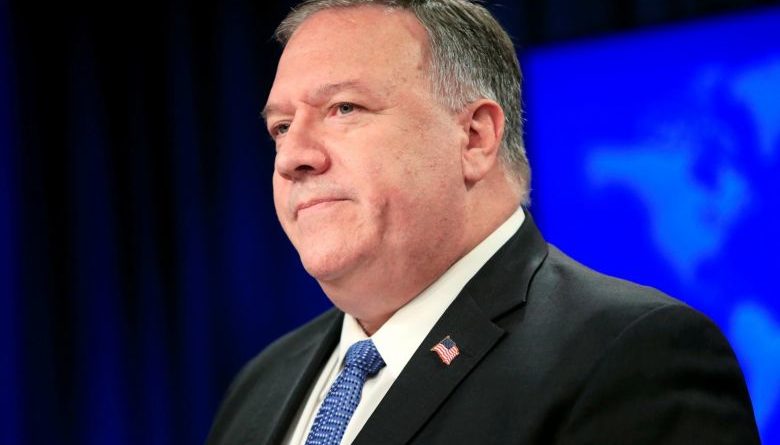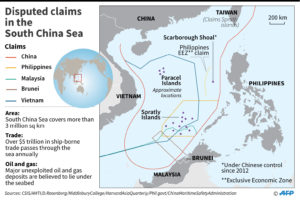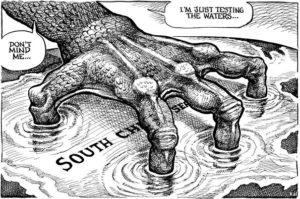THE DAILY PLANET:Pompeo shrugs off China’s objections over Taiwan visit, unveils new actions against Chinese apps and data access
WASHINGTON – US Secretary of State Mike Pompeo on Wednesday (Aug 5) shrugged off China’s objections to US Health and Human Services Secretary Alez Azar’s planned visit to Taiwan, saying it was not inconsistent with previous policy.
He also unveiled a series of new actions under a “Clean Network Programme” designed to reduce China’s access to American data.
“Cabinet members have travelled to Taiwan previously,” Mr Pompeo said. “He’s going there with a deep and important purpose. We’re still in a global pandemic.”
“Taiwan has had some significant success in how they have handled this. We have wanted them to be part of the conversations at the World Health Assembly that – China has prevented that from happening.”
“And so he’ll go there and talk to them about public health issues as they relate to how we all move forward with respect to how we handle Covid and the opportunity for therapeutics and a vaccine,” he said. “We welcome the expertise that Taiwan brings to that.”
His remarks in answer to a question, came hours after a sharp reaction from China.

Mr Azar will be the first US Cabinet official to visit Taiwan since then administrator of the Environmental Protection Agency Gina McCarthy in 2014 – and the highest ranking Cabinet member to make a visit since Taiwan and the US cut formal ties in 1979.

Mr Azar will meet medical experts and frontline health workers handling Covid-19 cases, and also meet with President Tsai Ing-wen, Foreign Minister Joseph Wu, and Health and Welfare Minister Chen Shih-chung.
The US officially follows the “One China” policy – not recognising Taiwan as an independent entity, but maintaining trade and business ties and supplying Taiwan with weapons.
China considers Taiwan a renegade province which will one day reunify with the mainland.
In Beijing, Chinese foreign ministry spokesman Wang Wenbin said on Wednesday: “China firmly opposes official exchanges between the United States and Taiwan”.

Mr Wang called for the US to keep to the “One China” principle and not send “wrong signals” to pro-independence advocates in Taiwan.
The visit by Mr Azar to Taiwan while focused on health and the pandemic, is difficult to separate from the wider context of the Trump administration painting the Chinese Communist Party as a malign actor and threat to democracies.
And just days ago the Trump administration said it wants to ban or force the sale of TikTok, the popular short video sharing platform owned by the Chinese firm ByteDance, in what Beijing called a “smash and grab.”
“Broadly, while in economic areas, enhanced ties is not really a problem, and a US-Taiwan Free Trade Agreement may be a good idea,” Dr Robert Manning, resident senior fellow at the Atlantic Council’s Scowcroft Center for Strategy and Security told The Straits Times.”
“But the larger context of China obliterating the ‘One Country, Two Systems’ myth in Hong Kong, always derided in Taiwan; dueling military exercises in the South China Sea and off Taiwan; and (Chinese President Xi Jinping’s) hyper-nationalist assertiveness across the board, not least rumblings in China of action on Taiwan, make the current situation particularly dicey.”
“And of course, having the Secretary of State give a major speech… all but calling for regime change, doesn’t help either,” Dr Manning added, referring to a July 23 speech by Mr Pompeo in which he called for the “free world” to stand up to Communist China.
Ms Yun Sun, senior fellow and director, China Programme at the Stimson Centre in Washington, told The Straits Times: “A visit by a Cabinet member does not constitute abandonment of US strategic ambiguity, and does not constitute the recognition of Taiwan as an independent country.”
“I don’t think China should react belligerently… although I know it will, perhaps by more military moves on the Taiwan Strait and around Taiwan island.”
“But I don’t think overt military takeover or a military conflict over Taiwan is in the Chinese cards,” she said.
“After all, they are waiting for the Nov 3 election to change the US President and its China policy. Getting into a conflict now will not serve that purpose.”

.
Meanwhile, Mr Pompeo announced five more measures in the form of a “Clean Network” programme – though how it will be implemented is unclear.
The programme will focus on five areas and include steps to prevent various Chinese apps, as well as Chinese telecoms companies, from accessing sensitive information on American citizens and businesses.
“Clean Carrier” would “ensure untrusted People’s Republic of China (PRC) carriers are not connected with US telecommunications networks”, he said.
“Clean Store” would “remove untrusted applications from US mobile app stores”.
“Clean Apps” will prevent “untrusted PRC smartphone manufacturers from pre-installing – or otherwise making available for download” apps, he said.
“Clean Cloud” will “prevent US citizens’ most sensitive personal information and our businesses’ most valuable intellectual property, including Covid-19 vaccine research, from being stored and processed on cloud-based systems accessible to our foreign adversaries through companies such as Alibaba, Baidu, and Tencent”, Mr Pompeo added.
And “Clean Cable” would ensure “undersea cables connecting our country to the global internet are not subverted for intelligence gathering by the PRC at hyper scale”.
“We will also work with foreign partners to ensure that undersea cables around the world aren’t similarly subject to compromise,” he said.

SIGN UP TO RECEIVE OUR EMAIL
.
The most important news of the day about the Earth and the Universe.
email us: [email protected]
8.6.2020
















